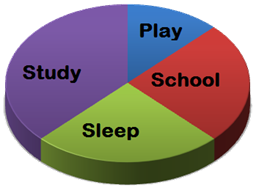With advanced technology at finger tips, concentrating on studies becomes hard these days. Study is not the process of just reading lines of a book. It involves understanding the ideas and grasping the knowledge. It is so hard to focus when you have so much going on in your head and distractions leads you to defocus from the context. Have you ever used a search engine to search something, but suddenly one search led to another and you ended up looking for something entirely different from the first? The same things happen while you study, isn’t it? But don’t worry!
Here are 5 effective study tips to improve your concentration to make optimum usage of your study hours.
1. Create A Good Study Environment

A good study environment allows you to maintain your concentration and maximize your learning efficiency. Everyone has his/her study environment preferences, so choose your preferences and make yourself free from all distractions. As much as possible you should try to designate a pleasant and tidy study space with good illumination and proper ventilation. This will help you in reducing distractions and increase your concentration. It is advised that you should gather all your necessary resources like textbooks, notes, study guides, previous years papers pens, etc. before you begin to study so that you don’t disturb yourself for retrieving your things when you’re studying.
2. Make A Study Plan

When you have too many things to study, it may seem hard to get through everything. Schedule your study session with specific subjects to study each day accordingly rather than to deep dive into one subject only. Segregate your study into logical sections that have a beginning and an end. For example, instead of learning all chapters of a certain subject by the end of day, just set a goal like “I will learn 1-3 chapter by 4

PM and then take a walking break.” That way, your study session transforms from a big frightening task to a smaller achievable goal.
Scheduling your studying habit is very necessary because by managing your time wisely through the week, you will have a clear vision of the time you can spend on activities different from studying.
3. Avoid Distracting Things

Texting, Facebook, Twitter, WhatsApp, Instagram, Snapchat and other distractions that come from our phone and other electronic devices are the biggest barriers to maintaining focus on studies. Engaging in such activities steals your concentration. You should turn off your electronic devices while you are studying, switch it on only when you are taking a break or when you are done.
The Internet is a tool that has the power to both educate and entertain, thus use it wisely. In order to learn the topic with concentration, you don’t need to use the internet for wasting hours of your precious time just scrolling useless pages seeking unimportant information.
4. Set Some Time To Worry
Schedule ‘worry time’ to decrease the amount of time you spend each day in worrying. Start by setting aside 15 minutes each day to think about the things that keep entering your mind and interfering with your concentration. For example, set 3:30 to 3:45 p.m. as your worry time.

If you ever find yourself worrying about something while you’re trying to focus, remember that you have a special time for worrying. Then, let the thought go of, and return your focus to your immediate activity. This will feel hard at first, and may require a lot of reinforcing self-talk (e.g., telling yourself over and over not to worry until it’s the appropriate time).
Always try not to worry about worrying outside of your worry time! Because you won’t be perfect with this exercise, even nobody is. But, your intention and effort will make a difference.
5. Study With Regular Breaks

Regular breaks are very essential to enhance your learning capacity and maintaining a high level of concentration. With routine and regular studies, the brain tends to stop thinking anything new, so make sure to take regular breaks as it allows your brain to recharge with fresh oxygen so that you can refocus on the topic and attack the concept with renewed energy.


 Free delivery in India for orders over Rs. 1,100.00.
Free delivery in India for orders over Rs. 1,100.00.





